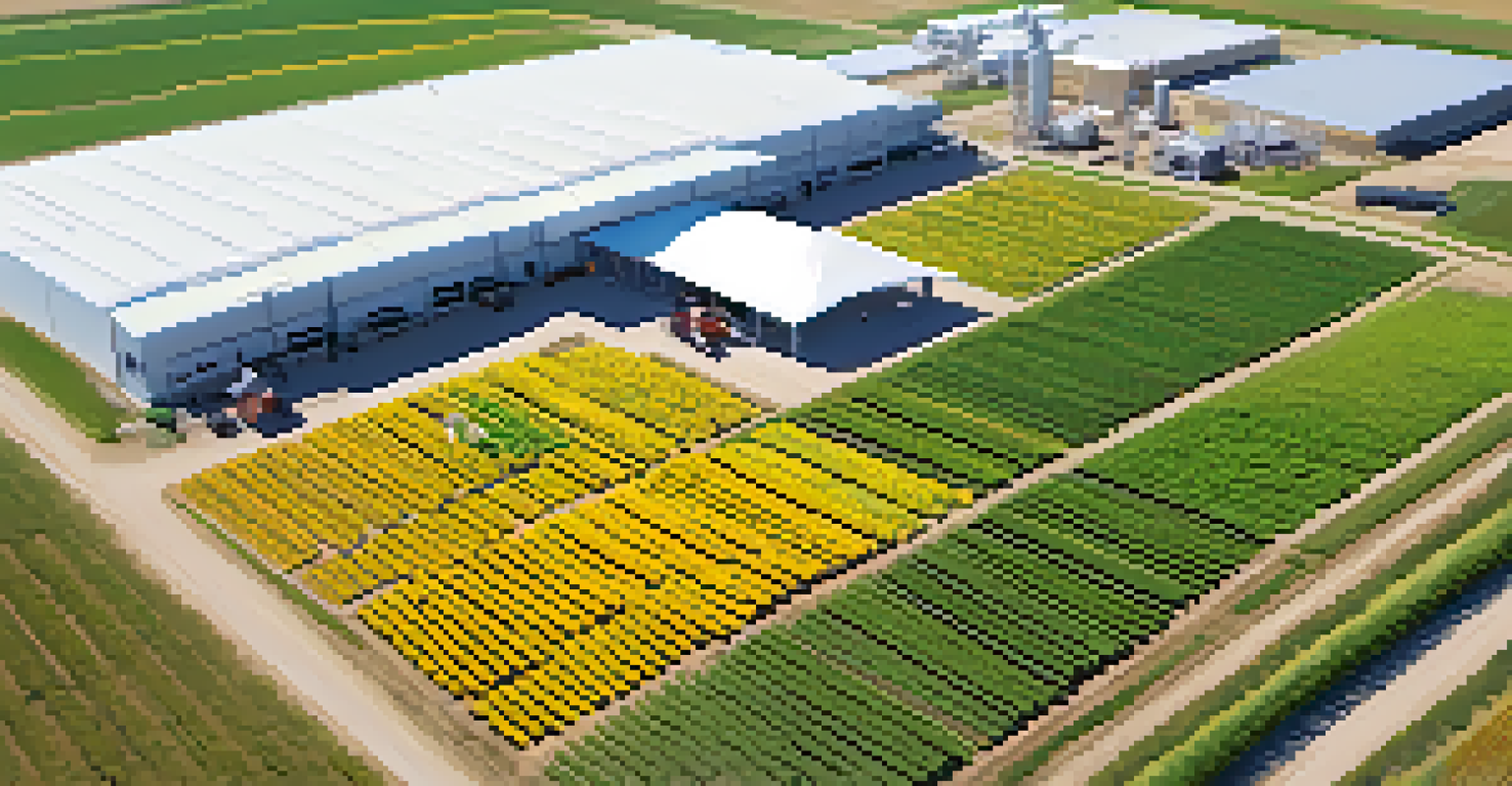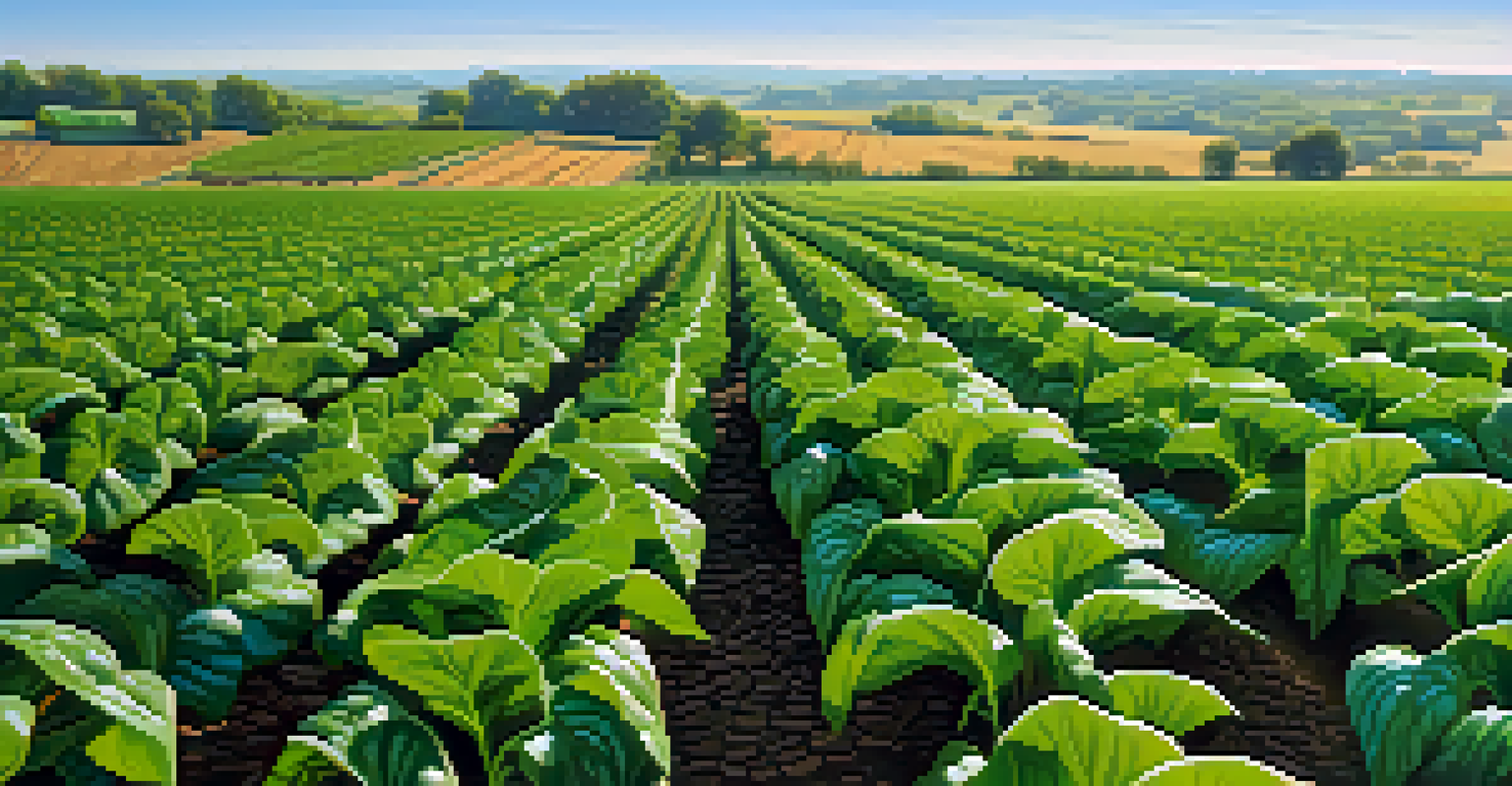The Future of Crop Research: Kansas Leading the Way

Introduction: Kansas as a Hub for Agricultural Innovation
Kansas has long been known as the breadbasket of America, but its role in agricultural innovation is gaining attention. With a rich history of farming and a strong focus on research, the state is poised to lead the way in the future of crop research. This unique combination of tradition and innovation makes Kansas a perfect case study for understanding how agricultural practices can evolve.
The farmer is the one who really knows how to feed the world.
The state's universities, such as Kansas State University, are at the forefront of this movement, conducting groundbreaking research to enhance crop yield and resilience. Researchers here are not just looking at traditional farming methods; they’re diving into cutting-edge technologies that can transform the agricultural landscape. This blend of knowledge and technology is setting the stage for Kansas to become a leader in crop research.
As we delve deeper into how Kansas is shaping the future of agriculture, we’ll explore the key research initiatives, partnerships, and technologies that are making a significant impact. From genetically modified organisms (GMOs) to sustainable farming practices, the innovations coming out of Kansas are paving the way for a more efficient and sustainable agricultural future.
Research Initiatives Driving Crop Innovation in Kansas
One of the standout initiatives in Kansas is the development of climate-resilient crops. As climate change continues to pose challenges for farmers, researchers are working tirelessly to create crops that can withstand extreme weather conditions. These advancements not only help ensure food security but also support the livelihoods of farmers throughout the state and beyond.

Another exciting project involves precision agriculture, where technology is used to monitor and manage crop health. This approach allows farmers to make data-driven decisions, optimizing their resources and improving yields. By integrating sensors, drones, and satellite imagery, Kansas researchers are leading the charge in making agriculture more efficient and sustainable.
Kansas Leads in Crop Research Innovation
The state is at the forefront of agricultural advancements, focusing on sustainable practices and cutting-edge technology to improve crop yields.
Furthermore, the collaboration between public institutions and private companies is fostering a culture of innovation. By pooling resources, knowledge, and expertise, these partnerships are accelerating the pace of research and bringing new technologies to market faster than ever before. This collaborative spirit is crucial for addressing the complex challenges facing agriculture today.
The Role of Technology in Modern Crop Research
Technology plays a pivotal role in the evolution of crop research, and Kansas is embracing this trend wholeheartedly. From biotechnology to artificial intelligence, researchers are harnessing the power of innovation to enhance crop development. For instance, genetic editing technologies like CRISPR are being employed to create crops that are more nutritious and resistant to diseases.
Sustainable agriculture is a principle of farming that focuses on producing food in a way that is environmentally friendly, socially responsible, and economically viable.
Moreover, the integration of data analytics is revolutionizing how researchers approach crop management. By analyzing vast amounts of data, scientists can identify trends and predict outcomes with unprecedented accuracy. This allows for more targeted research efforts and ultimately leads to better crop varieties that can thrive in varying conditions.
As these technologies continue to evolve, the potential for Kansas to lead in crop research becomes even more promising. With a commitment to exploring new frontiers, the state's researchers are setting an example for others to follow, showcasing the importance of embracing technology in the agricultural sector.
Sustainable Farming Practices: Kansas Leading the Charge
Sustainability is at the heart of modern crop research, and Kansas is making significant strides in this area. Researchers are exploring various practices that minimize environmental impact while maximizing crop productivity. From cover cropping to crop rotation, these sustainable practices not only improve soil health but also enhance the overall resilience of agricultural systems.
Additionally, Kansas is focusing on reducing water usage through innovative irrigation techniques. By implementing smart irrigation systems, farmers can conserve water while ensuring their crops receive the necessary hydration. This approach not only benefits the environment but also helps farmers save on costs, making it a win-win situation.
Collaboration Drives Agricultural Progress
Partnerships between researchers and local farmers enhance practical solutions and foster innovation in crop management.
The state's commitment to sustainability is also reflected in its research funding and initiatives. By prioritizing projects that promote eco-friendly practices, Kansas is paving the way for a more sustainable agricultural future. This focus on sustainability is essential for ensuring that future generations can continue to rely on agriculture for their food and livelihoods.
Collaboration with Local Farmers: A Partnership for Progress
Collaboration between researchers and local farmers is a cornerstone of crop research in Kansas. By working together, they can share insights and experiences that drive innovation and improve agricultural practices. This partnership not only enhances research outcomes but also ensures that the solutions developed are practical and relevant to the needs of farmers.
Farmers provide invaluable feedback on the challenges they face, which helps researchers tailor their studies accordingly. This two-way street fosters a spirit of cooperation that is essential for advancing agricultural science. As a result, many research initiatives in Kansas are designed with input from those who will ultimately implement the findings on their farms.
Moreover, these collaborations often extend to community outreach programs, where researchers conduct workshops and training sessions for farmers. By empowering the farming community with knowledge and resources, Kansas is creating a more resilient agricultural sector that is well-equipped to tackle the challenges of the future.
The Economic Impact of Advancements in Crop Research
The advancements in crop research coming out of Kansas are not just beneficial for farmers and the environment; they also have significant economic implications. By improving crop yields and reducing costs, these innovations can enhance the profitability of farming operations. This, in turn, contributes to the overall economic health of the state and the nation as a whole.
Additionally, the growth of the agricultural technology sector in Kansas is creating new job opportunities. As companies develop and implement cutting-edge agricultural solutions, the demand for skilled workers in this field is on the rise. This influx of jobs not only supports the local economy but also encourages young people to pursue careers in agriculture and related sciences.
Economic Benefits of Agricultural Advances
Innovations in crop research not only boost profitability for farmers but also create new job opportunities in Kansas's agricultural technology sector.
Furthermore, the global demand for food continues to rise, and Kansas is well-positioned to meet this need. By leading the way in crop research, the state can play a crucial role in feeding a growing population while maintaining sustainable practices. This economic potential makes the future of crop research in Kansas not just a local concern, but a national priority.
Conclusion: Kansas Shaping the Future of Agriculture
As we look to the future, it’s clear that Kansas is at the forefront of crop research and innovation. Through a combination of cutting-edge technology, sustainable practices, and collaborative efforts with local farmers, the state is setting a benchmark for agricultural advancement. The initiatives taking place in Kansas are not just about improving crop yields; they’re about creating a sustainable future for agriculture as a whole.
The lessons learned and innovations developed in Kansas have the potential to influence agricultural practices worldwide. By sharing their findings and best practices, researchers in Kansas can inspire others to adopt similar approaches, fostering a global movement toward more sustainable and efficient farming.

In essence, Kansas is not just leading the way in crop research; it’s shaping the future of agriculture. As we continue to face challenges such as climate change and food security, the innovations emerging from this great state will be crucial in ensuring a sustainable and prosperous agricultural landscape for generations to come.